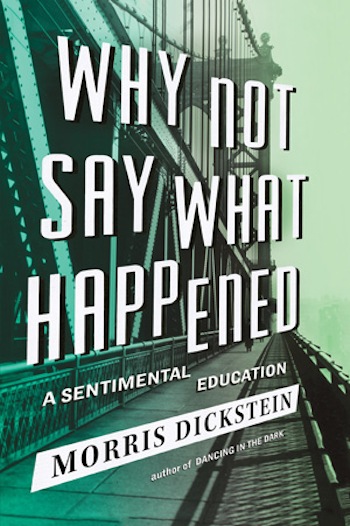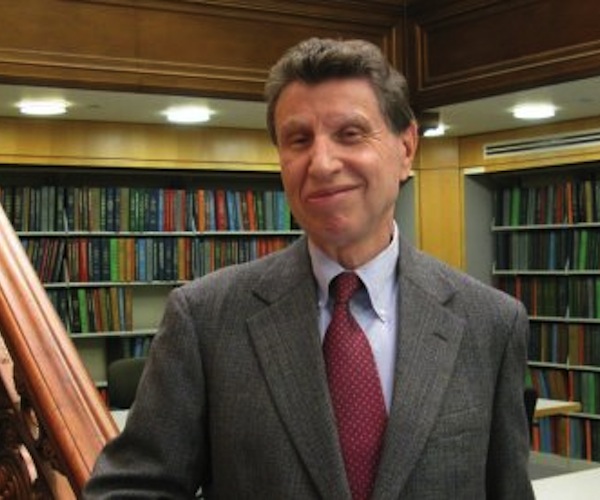Arts Remembrance: “Why Not Say What Happened” — Morris Dickstein’s Memoir About Living a Life of the Mind
RIP Morris Dickstein, among the last of the generation of the New York School of Jewish intellectuals, scholar/critics of massive knowledge and intellect who came from humble backgrounds.
Below is a review of Dickstein’s 2015 memoir.
By Gerald Peary
What makes this memoir so winning? For those of us who value a formal education when done right, Why Not Say What Happened is a glorious celebration of a life lived to the hilt in the classroom.
Why Not Say What Happened: A Sentimental Education, by Morris Dickstein. Liveright, 320 pp, $27.95.

Morris Dickstein’s father was shy and modest, his mother a chronic worrier, and they rarely ventured beyond work, home, relatives, and going to synagogue. They moved from the Lower East Side to anonymous Long Island and that was enough, as the world outside was an unnerving place. Don’t take chances! Obviously, Dickstein, a distinguished film and literary critic and a renowned university professor and author, went far beyond his timid parents, starting with the moment he dared move to Morningside Heights to attend Columbia University. But what’s telling in Dickstein’s personable, intellectually engaging memoir, Why Not Say What Happened: A Sentimental Education, is that the path he’s chosen is hardly a wild, chaotic break from his parents’ attitudes. Or his righteous Orthodox religious education.
Here is a man who, born in 1940, has led a clean, straight-laced life. From childhood through graduate school, Dickstein was always a terrific student and an obedient one. His book is dedicated to girlfriend L, who became Lore Dickstein, his wife. He has a family. Though he stopped being a believer, it took him many years to give up being Kosher and to cease volunteering to lead Hebraic religious services. Dickstein seems at peace with his Orthodox rearing, and he has an affection for his parents and other relatives. There is no anger at all in this book about the way Morris was brought up.
Dickstein’s parents never went anywhere, nor wanted to. At college he became a traveler. But with the exception of sojourns to Paris, Venice, and other continental stops, Why Not Say What Happened sticks closely to a Bermuda’s Triangle of Ivyish academic spots, following Dickstein, in college and graduate school, shuffling between Columbia and Yale, then Yale and Cambridge. Even in the turbulent 1960s, there’s no dropping out, no acid journeys, no heading to San Francisco with daffodils in his hair. He was a Vietnam War protestor, but he remained, as a young professor, in and about school. He wrote for many years for Partisan Review, but quietly, far later than its famously anarchic, quarrelsome period.
Dickstein does have a few anxious moments, when he can’t find his bearings at Cambridge, when he suffers headaches and psychosomatic illnesses, when his wife has a miscarriage, and, most traumatic of all, when he’s denied tenure from his beloved Columbia. But, in general, he’s had the terrific, fulfilling life. He’s been, in order, a good son, a loyal, dedicated husband, and an extraordinary scholar. Dickstein is pretty matter-of-fact about it, but Why Not Say What Happened is an American success story. Its plot follows an archetypal trajectory of the studious boy from a humble Jewish family doing great at school, earning a scholarship for college at Columbia, and continuing to do great because of his consummate work ethic and inexhaustible intellectual curiosity.
What makes this memoir so winning? For those of us who value a formal education when done right, Why Not Say What Happened is a glorious celebration of a life lived to the hilt in the classroom. What exciting chapters, when, on the cusp of the 1960s, young Morris thrives in his course work at Columbia, inspired by the brilliant, passionate faculty! Dickstein: “It’s strange that I should be writing about my undergraduate courses and teachers more than half a century later. But the best of these were…mind-altering experiences.” Here are a fraction of the writers he eagerly read as an undergraduate: St. Augustine, Kafka, Lawrence, Dostoevsky, Conrad, Nietzsche, Freud, Shakespeare, Hegel. His finest instructors were often the least famous and least published, several suffering from acute writer’s block. The legendary Lionel Trilling was a halting, sometimes ineffectual lecturer, and the famous Jacques Barzun more of a slick campus politician. Still, “I had just begun to think of teaching as a vocation, thanks to Trilling and Barzun; in my own teachers I could see what made it attractive. They were careful scholars but also freewheeling minds, seemingly interested in everything, following questions wherever they lead.”
Dickstein decided on Yale for graduate school and, for a long time, he felt he’d made a grave mistake. He felt numbed by the prevalent literary doctrine of New Criticism (Cleanth Brooks was a force on the faculty), and “Class time was devoted not to teaching but mostly to hearing fellow inmates read their papers aloud.” Unlike at Columbia, “The category of beauty, the ecstatic moment of personal transcendence, had little relevance to literary scholarship.” School was a grind, a grim training ground for future teachers and scholars. The upside of living in New Haven: Dickstein met L, his future wife, at Bear Mountain.

Distinguished film and literary critic Morris Dickstein — he is pretty matter-of-fact about it, but his life is an American success story.
Would things be better at Cambridge, where Dickstein went for further graduate study? During one of his initial trips to England, more than any time in his book, the author suffered — from cold, damp rooms, from soggy, inedible food, from anxiety and homesickness, both for his girlfriend and family. But a return to Cambridge was far better, where Dickstein not only enjoyed the extraordinary early ’60s film scene (the French New Wave, the discovery of American auteurs like Hawks and Ford) but he had a breakthrough at the university. He took a course with F.R. Leavis, England’s version of Lionel Trilling, both moralists about literature, both deeply stingy about what writers they would allow into their tiny pantheon. This was the year that Leavis finally acknowledged Dickens as worthy of study, despite the melodrama and popular writing. And Dickstein likewise became enthralled by Dickens, just at the moment when he himself was finding, especially through movies, that the categories of high and popular culture could merge in thrilling ways. Leavis’s favorite Dickens novel became Dickstein’s also: Little Dorrit, with Dombey and Son in second place.
Back at Yale, Dickstein was faced with writing his PhD dissertation. Good timing: a young Harold Bloom had joined the faculty. Slovenly, sensual, clearly Jewish, he was despised by many of the staid older professors, and he in turn loathed the prudent close readings of New Criticism. He was an unabashed romantic who adored Romantic poetry. Under Bloom, Dickstein did his dissertation on Keats, and earned his PhD. The rest is history. The dissertation became a book, Keats and His Poetry: A Study in Development. Other estimable tomes followed, including the acclaimed Gates of Eden: American Culture in the Sixties and Dancing in the Dark: A Cultural History of the Great Depression. Currently, he is Distinguished Professor Emeritus of English and Theatre at the CUNY Graduate Center. One heck of a life!
There is only one problem with Dickstein’s fine memoir. There is no index at the end. Shame on you, W.W. Norton & Company, publisher of Liveright, for saving a little money this way. It’s absurd with a book so rich in cultural references that you can’t find them easily. It was only through flipping back and forth through the book, that I ultimately landed on the pages I eagerly wanted to read again. Check out pages 216-22 for Dickstein’s elegant, emotional explanation of the wonderfulness of John Keats. This mini-essay, I venture, would make his Columbia professors of a half century ago extremely proud.
Editor’s Note: (The Arts Fuse also interviewed Dickstein about his career and the state of cultural coverage: “Arts journalism should meet the same high standard as other forms of writing but rarely does, even in the good old days.”)
Gerald Peary is a professor at Suffolk University, Boston, curator of the Boston University Cinematheque, and the general editor of the “Conversations with Filmmakers” series from the University Press of Mississippi. A critic for the late Boston Phoenix, he is the author of 9 books on cinema, writer-director of the documentaries For the Love of Movies: the Story of American Film Criticism and Archie’s Betty, and a featured actor in the 2013 independent narrative Computer Chess
Tagged: American literature, Columbia University, criticism, memoir, Morris Dickstein
